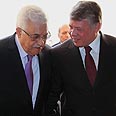
Israel, Palestinians exchange blame over talks
Leaders on both sides point fingers for impasse in newly launched peace efforts, raising doubts about whether dialogue would continue just weeks after it began
The Israeli and Palestinian leaders on Sunday blamed each other for the impasse in newly launched peace efforts, raising doubts about whether the dialogue would continue just weeks after it began.
Palestinian President Mahmoud Abbas accused Israel of spoiling the low-level talks, saying it failed to present detailed proposals for borders and security requested by international mediators. Israeli Prime Minister Benjamin Netanyahu said the Palestinians "refused to even discuss" Israeli security needs.
Relates stories:
- Abbas: Peace talks important, but chance for success slim
- Israel, PA reps' Amman meeting yields no results
- Israeli-Palestinian talks end without breakthrough
For the past month, the sides have held Jordanian-mediated exploratory talks at the urging of the Quartet of international Mideast mediators - the US, UN, EU and Russia. The goal of the talks has been to find a formula to resume formal peace negotiations, with the aim of forging an agreement this year.
The Palestinians say a three-month period set by the Quartet for the exploratory talks ended last week, counting from the day the mediators issued their marching orders last October.
Abbas, though deeply skeptical about Netanyahu's intentions, is under intense international pressure to stay at the table and would risk being blamed for the failure of the latest Mideast peace efforts if he leaves.
Walking away would be a risky strategy at a time when he seeks global recognition of a state of Palestine ahead of a possible border deal with Israel. UN chief Ban Ki-moon is expected in the region this week to help keep the talks alive.
A rockey start
Abbas said Israel's efforts so far have fallen short.
"By not presenting a clear vision on the issues of borders and security, as the Quartet demanded, Israel foiled the exploratory talks in Amman," Abbas said in remarks published late Saturday by the Palestinian news agency Wafa.
Israel has said it wants to keep talking and is serious about reaching a deal by year's end. It says the exploratory talks should continue for another two months, starting its countdown of the Quartet's three-month period from the beginning of meetings in early January.
Addressing his Cabinet on Sunday, Netanyahu said the dialogue had gotten off to a rocky start, but held out hope the talks would continue.
"Until this moment, according to what happened in recent days, the Palestinians refused to even discuss with us the needs of Israel's security," he said. "The signs are not very good, but I hope they will come to their senses and we'll continue the talks so we can reach real negotiations."
Netanyahu later added his condemnation of a Palestinian state-run television show that praised the murderers of a Jewish settler family of five as "heroes." The TV station hosted relatives of the killers of the Fogel family, who were stabbed in their sleep last March. Among the dead were a 4-year-old boy and his baby sister.
"The only way to make progress in peace is to prepare our people for peace and not cruel terror," he said. "We are ready to continue in talks and we hope that the Palestinian Authority will decide to renew talks and stay away from the way of terror and glorifying the murderers."
Palestinian spokesman Husam Zomlot said he was not aware of the TV show and would look into the matter.
The Quartet had asked both sides to present detailed proposals on borders and security arrangements between Israel and a future Palestinian state, in hopes the exploratory talks would evolve into full negotiations.
The Palestinians said they presented four-page proposals on each subject, but refused to elaborate. Palestinians said Israel presented its principles for drawing a border with a future state of Palestine - the first-ever indication by Netanyahu on how much land he would be willing to relinquish.
Two Palestinian officials said last week that Israel proposed keeping control of east Jerusalem and essentially turning its West Bank separation barrier into the border. That would place attach roughly 10% of the West Bank to Israel.
Israeli officials have declined comment.
The Palestinians want to establish their state in the West Bank, Gaza Strip and east Jerusalem, territories Israel captured in the 1967 Mideast war. The Palestinians, who regained control of Gaza in 2005 after Israel's unilateral withdrawal, have said they are willing to swap some land to enable Israel to keep some of the largest of dozens of settlements it has built on occupied lands. In talks with Netanyahu's predecessor, the Palestinians suggested swapping 1.9% of the West Bank, while Israel proposed 6.5%.
Palestinians reject any deal that leaves east Jerusalem under Israeli control.
- Receive Ynetnews updates directly to your desktop










